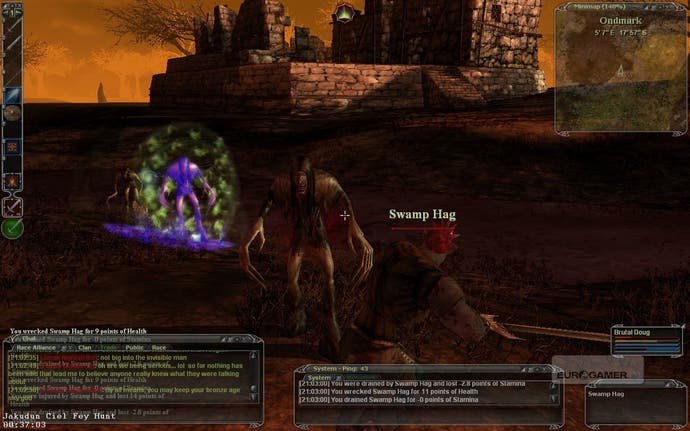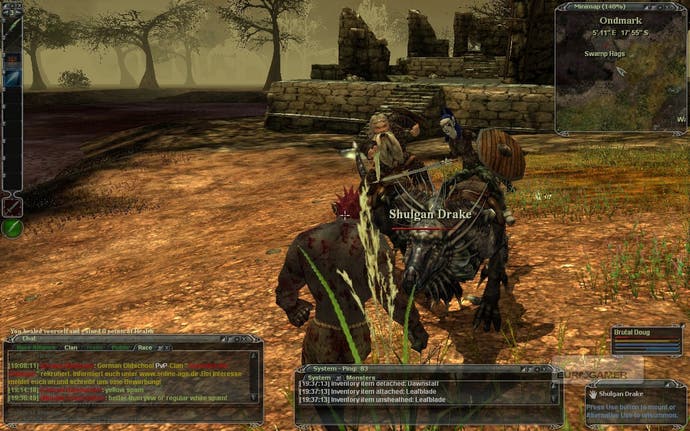Darkfall Online
We can't be friends, we can't be enemies.
Of course, I haven't played it enough.
There is a history here, which would be foolish to pretend doesn't exist. When Darkfall was first reviewed on Eurogamer, it scored 2/10. The developer, Aventurine, was incensed. They'd checked their logs to discover the reviewer had a total logged-in time of a couple of hours. Eurogamer pressed their reviewer, who claimed their numbers must be wrong. He gave it at least nine hours. Eurogamer offered a re-review. Aventurine declined. Eurogamer bought an account anyway. And two months later, I'm here.
That's the short version. There's much more you can dig into, if you like. But from that brief precis, you know I could never have played it enough. The first review leaves a long shadow. I still haven't read it. Seemed beside the point.
Darkfall is a fantasy massively-multiplayer online role-playing game. Which seems an uncontroversial sentence, but conceals another slice of history. Darkfall has been in development forever. Since 2001. It's a game which has its own vision, one which manages to hark back and forward simultaneously. Rather than the class-based system which has dominated in contemporary times, where your abilities are linked to a choice of class and how you choose to progress it, it's a skill-based system. There's races, but their effect is relatively secondary. Like Ultima Online, it's a game where you primarily improve by doing whatever you want to do. Hit stuff to improve your sword-fighting. Chop wood to improve you chop-wooding. Sit down and have a nice rest to improve your sitting down and nice-resting.
Throw in full open player-versus-player combat (i.e. as many random assaults as a North London tube station at closing time) and full looting, and you've got a game which clearly believes something has been lost by mollycoddling players. If they could, you suspect they'd implement a way to give tiny electric shocks through your keyboard every time someone slides a blade into your back when you're fishing. It's good for you. It means everything means something.

I think they may be right, but I'll get back to that eventually.
Where Darkfall is more progressive is in its complete rejection of the usual timer-based combat, embracing an action implementation instead. When spell-casting or firing arrows - and remember that characters can excel in each of these areas as long as they practice in each - the game plays from a first-person perspective. If you use a melee weapon, it goes to third-person. Whatever you aim at, you hit.
The amount of damage you do is based upon your skills, but there's a direct use of player skill - even at the most basic level - which is almost absent in most MMOs. It's not a game where you stand toe-to-toe with a monster, trading blows, safe in the knowledge that your damage-per-second is slightly higher than his, so his health bar will exhaust before yours. Partially because of the aforementioned mechanics and partially because anyone passing and seeing you in such a vulnerable state is just going to leg it over, bash you on the head and take all your stuff. And call you a care bear. With constant friendly-fire on, you're just as likely to kill your friends as anyone else. It's brutal.
I wish the combat system was deadlier, but I'll get to that eventually too.
Okay. Bar the endgame - player-controlled cities and warring guilds and mass sieges, and enough to make this, no matter what the flaws, probably the closest there is to a terrestrial-set EVE Online in terms of player-politicking - that's the basics.
Let's take a detour.
Interlude 1: Aventurine vs Eurogamer. Why No-one Could Back Down
In short, for one side, there was all the proof in the world. For the other, there was nothing.
From Aventurine's perspective, they have logs showing that a reviewer who slaughtered their love-child had barely touched the game. They're happy to show them to Eurogamer. Hell, they're so confident they're happy enough to fly a tech guy over to show them the logs. It's clear the reviewer is lying about how much he's played. The review is an outrage and a fiasco.

From Eurogamer's perspective, they have a developer claiming that logs show something. Logs which are entirely within their control. I'd be surprised if Eurogamer has a tech guy in-house capable of ascertaining the meaning of the logs. More so, when changing logs is an absolutely trivial task, what the logs say when that tech examines it is ultimately meaningless. If Aventurine was dissembling, Eurogamer wouldn't be able to tell.
As long as the reviewer claimed reasonably that he'd played the game for longer, Tom [Bramwell, editor] had to back him because - really - it was his word against theirs. And if an editor takes the developers word over the staff...
- Every writer would look at him with contempt. I certainly would. If I'm putting my balls on the line, I'd like someone with a spine behind me.
- He would leave himself open to any developer trying the same thing. Whether Aventurine are telling the truth or not doesn't matter. The fact remains: logs can be edited effortlessly. If you set a precedent of believing other people's logs over your own employee's word, you can guarantee there are developers disreputable enough to do try and take advantage of it the next time a bad review is aimed in their direction.
Of course, it could just be an old technical error and the logs didn't get the times right. I'd like to think so. I don't think it's likely, but that it was no human malice here would be the best possible ending to a pretty horrible situation.
For the record: If I ever actually find out conclusively that someone was lying in this matter, I will do everything I can to destroy them.


